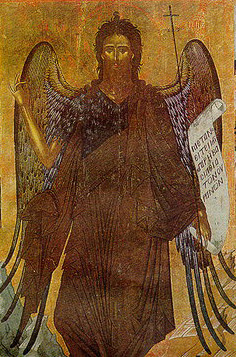The Desert's Seductive Charm: Part II

"فِتنَة ُ الصَحراءِ "
The Desert's Seductive Charm
A Novella by Aḥmad Abū Khanayjar
The Desert's Seductive Charm
A Novella by Aḥmad Abū Khanayjar
(Translated from Arabic by Khalil al-Wafa')
(٢)
Even though I agree with him about this beginning, as one of the many beginnings with which it is possible to start; especially since it is more distinctive than other, more feeble beginnings. For there are (many) possibilities for the beginning, like: "On the day of the eclipse...or the day of the race....or on the day of infamy....or...." But he is free, so let him begin how he wants. However, the gentleman then must permit me to record some imperfections afflicting this beginning which almost lends itself to attracting the eye of the reader and the ear of the hearer:
1) Why has he still not named his two protagonists at this point (in the story,) even though the story is realistic and the characters are well-known to everyone who lives in these parts? Or at least, he's heard their story of crossing the desert roads; (the same roads) which spread their story and publicized it among the caravans traveling between the tribes and their markets.
And what is he getting at? Be on guard my dear friend, the reader! The first harbinger of magic is suggestion and the commingling of events which we are unable to separate. But I will reveal their names to you to spite him: Abel and Cain.
2) He is stuck on the waiter in the cafe without a clear goal. What is his role? What does this gentleman want exactly? 'Tension,' as the saying goes? If the role of the waiter is to increase the tension of the events and also serve to link them, then is this plausible?
3) Finally, he should have indicated what Cain purchased as the two were leaving the market where he bought a dagger. Why is he concealing this information?
• • •
-6-
The road to the tribe's camps is long, taking a full seven days and seven nights. So I have to let them walk, between them that camel which seized their vision and their hearts. And it was walking leisurely, like a bride ambling towards her groom.
The tale has been tranquil up to this point and the journey is long. On account of this, I will let them cross the road of desire slowly. And I will pause briefly to reveal what is ambiguous to you in the (yarn) I have been weaving for a short time. In front of me are seven nights, with seven councils. In them, I will narrate for you everything that will open the locks on events. But, in a measure. . . .
The First Council :
Know then! They are paternal and maternal cousins at the same time. They were born on the same night after seven years of torturous waiting. After six, barren years had passed in the marriages of the two brothers to the two sisters, throughout which they had tried everything and every medicine, hopelessness began to creep inside them. But the female soothsayer seemed to be a solution and final hope.
They went to her. She said after she threw her seashells on the sand between them: "Seven years, and seven years, and the full moon since the moment of its appearance at the pool of water, each of the two sisters would lie sleeping, naked, spreading her legs to the rays of the moon, following it wherever it goes. At the same time, the two naked brothers are in the water the whole time and at the moment of the moon's setting, two men come out of the water, and each one would have sex with his wife. Then, wrapping her in his gown, he returns with her to his tent, carefully (preventing) the air from touching her."
After arguing and quarreling, protesting and hysteria, everyone accepted. The longing for a son and the need for one who would bear the name before they disappeared into the desert sands was stronger than any other warning. So they went to the pool of water and carried out the instructions of the soothsayer exactly.
Nine months later, two children were born. It was as if they were twins, impossible to tell them apart. And to ward off the evil eye, they gave each of them the name: Hasan.
The Second Council :
They grew in exact proportion to one another, becoming two strong, young men. Life pulsed powerfully in their veins. They were never separated from one another, even sleeping, a night here and a night there. But what most worried people was their lack of interest in participating in the camel race which the tribe annually undertook four nights after celebrating ʿAshūrāʼ.
The tribe believes that the moon on an ancient night resembled the moon on this night – the night of the full moon. (Then, the moon) descended from on high when he saw a nymph from among the earth's daughters, treading lightly near the pool of water. He descended without her sensing him as he walked on the desert sands towards her. She had already taken off her robe, wanting to bathe, when she sensed him. So she dove quickly into the pool to hide her nakedness.
The moon stood confused when he couldn't find her. But the sand betrayed her secret to him, so he descended behind her and caused her to conceive by his rays. Then she came out (of the water) and gave birth to the original grandfather and grandmother of the tribes. But the daughters of the jinn noticed the moon's repeated descent to the pool, so they tried to kidnap and trap him, to keep him from the pool. So he ascended back into the sky and never repeated the descent. For he keeps trying to free himself from the snares of the jinn's daughters, who for their part keep trying to capture him again.
In imitation of this day, the tribe holds a camel race. And in the evening, the celebrations begin with the victor, who has the right to choose any bride he wants. Even if she is engaged to her cousin, still she becomes his right. For this is the custom.
These two were averse to participate, but what happened on the day of the eclipse... excuse me.... If you want to know what happened, wait for me in the next council.
The Third Council :
When years passed without the two seeming to have a desire to participate in the race, and also showing no interest in marriage, as was customary, the unease which began insignificant and weak started to grow, until it became a nightmare hanging over the hearts of fathers and mothers.
Thus, despite their nature which was superior to their peers in the field of work and (despite) the number of heads (of cattle) which they owned: sheep, goats and camels; still, their shunning of the time-honored custom made them the subject of innuendos, conversation and rumors. All of this compelled the mother/aunt to ask them on that particular night about the reason for their aversion to women?
They understood from the beginning what the mother/aunt was getting at with her choice of the word, "women," instead of the word, "marriage." And when it seemed to them by the tone of (her) voice that there was a strong accusation being leveled against their manhood, or doubts abounded concerning them, one of them said: "We never found a women like you." The mother/aunt laughed, but ignored (his) circumvention (of the question.) Determined to know the answer, she said unequivocally: "Women all seem the same in bed."
In this way, the intimations increased in maliciousness and prominence. So one of them responded harshly, "But we never found someone who compelled us to leave one another, taking us to bed!"
The mother/aunt was reassured a little, even though she was intent on getting the young women's confirmation by enticing them to her tent. Perhaps . . . maybe . . . what she wanted was verification from the other direction.
So in the night on which the moon was eclipsed, the young women went out with tambourines and cymbals, singing and dancing to help the moon escape from the snares of the jinn's daughters who veiled him. And they set out in the direction of the well, laughing with the naiveté of girls and the frivolity of their intellects.
Among the maidens were two girls, causing all eyes to become fixed on them and a heavy silence to descend among the young men. This silence came commensurately to the two of them, causing them to turn towards one another and withdraw at a distance. Then they ran in the direction of the shepherd's fields, where the old, camel herd was pasturing their flock. They told him briefly about their desire to participate in the camel race and win it. The man laughed at length, taking his time to know (fully) what had happened. Then he counseled them. From there, the two set out in the direction of the distant market.
To Be Continued . . .





























0 Comments:
Post a Comment
<< Home